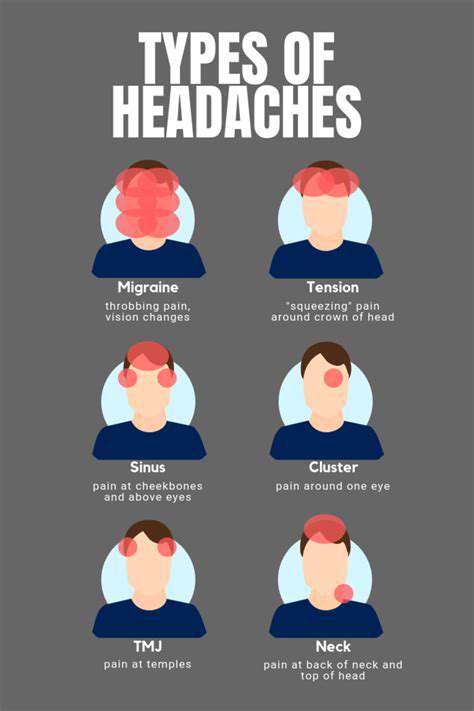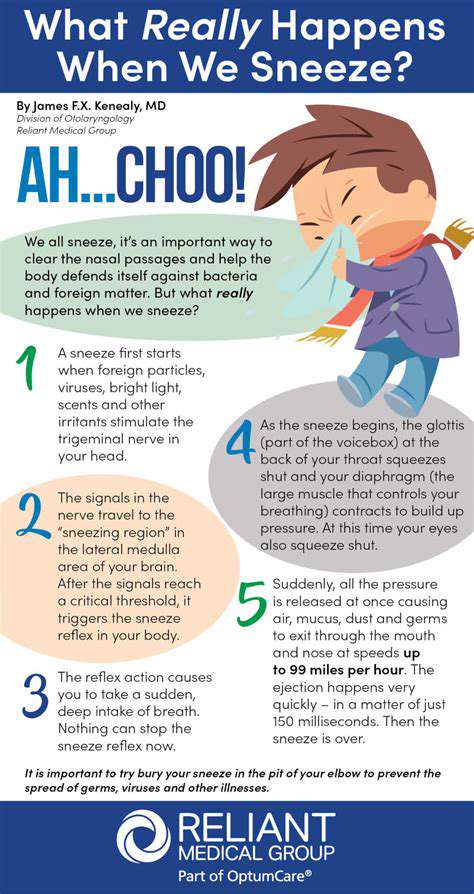Common Causes of Head Pain During Sneezing

Muscle Tension and Strain
Experiencing head pain during sneezing can often be attributed to muscle tension in the neck and shoulder area. This tension can build up due to poor posture or prolonged periods of sitting, especially while working at a desk. When you sneeze, the sudden force can exacerbate existing tension, leading to discomfort or pain in the head. Stretching and maintaining good posture may help alleviate some of this tension over time.
Individuals who are prone to tension headaches are especially susceptible to experiencing head pain when sneezing. Regularly engaging in relaxation techniques, such as yoga or deep breathing, can help reduce overall muscle tension. It is important to be mindful of body mechanics while sneezing, as improper alignment can trigger pain. Incorporating regular exercise can also strengthen the muscles and prevent strain.
If head pain persists, it is advisable to consult a healthcare professional to rule out any underlying issues, such as cervical strain. Appropriate treatment can include physical therapy or massage to relieve muscle tightness. Strengthening exercises can then be introduced to enhance stability and flexibility in the neck and shoulders.
By understanding the connection between muscle tension and sneezing-induced head pain, individuals can take proactive steps to manage and reduce their symptoms. Implementing strategies for relaxation and muscle health will contribute to a decrease in frequency and severity of these headaches.
Sinus Issues and Allergies
Sinus issues, including sinusitis or allergies, are significant contributors to head pain during sneezing. When sneezing occurs, it can create pressure in the sinus cavities, leading to discomfort or pain in the head. Individuals with chronic sinus conditions may find that sneezing exacerbates their head pain. Therefore, it's essential to understand how to manage these conditions effectively.
Allergic reactions can cause inflammation in the nasal passages, which often results in sneezing and associated head pain. Identifying allergens and minimizing exposure can significantly alleviate these symptoms. Over-the-counter antihistamines and nasal decongestants may provide relief from allergic reactions, reducing the chances of experiencing pain during sneezing.
Consulting with an allergist or an ENT specialist may help individuals develop a more personalized approach to managing sinus-related issues. In some cases, immunotherapy might be suggested to address the root causes of allergies. Addressing sinus health not only helps relieve immediate symptoms but also contributes to long-term wellness.
Maintaining proper hydration and using saline sprays can also assist in keeping the nasal passages moist and clear. A good sinus health regimen can minimize the chances of sneezing-related head pain occurring frequently.
Neurological Factors
Head pain when sneezing may also relate to neurological factors such as migraines or cluster headaches. These types of headaches can be extremely sensitive to changes in pressure, which can occur during a sneeze. For some individuals, the act of sneezing can trigger a migraine episode. Recognizing this connection can be crucial for those suffering from frequent migraines.
Individuals with a history of headaches should keep a headache diary to identify potential triggers, including sneezing. This information can be valuable for healthcare providers to develop an effective treatment strategy. In some cases, medications may need adjustment to better control headache episodes.
It’s essential for those experiencing significant head pain during sneezing to seek a thorough evaluation by a healthcare professional. They may need to assess for any underlying neurological conditions that require specific treatment. Comprehensive management plans may include a combination of lifestyle changes and pharmacological therapies.
By focusing on both lifestyle adjustments and appropriate medical interventions, individuals can work to minimize the impact of neurological factors on their sneezing-related head pain. Understanding and addressing these issues is key to improving overall quality of life.
When to Seek Medical Advice

Understanding the Mechanism of Sneezing
Sneezing is a reflex action that helps expel irritants from the nasal cavity. It involves a complex interaction between the nervous system and the respiratory system.
During a sneeze, the body rapidly expels air, which can increase pressure in the head. This sudden pressure change can lead to discomfort or pain in some individuals.
Common Causes of Head Pain During Sneezing
One of the primary causes of head pain when sneezing can be sinusitis, which involves inflammation of the sinuses. Blocked sinuses can create a feeling of pressure that intensifies during a sneeze.
Other common causes include tension headaches and migraines, which can be triggered by the force of a sneeze. Individuals who experience frequent headaches may find that sneezing exacerbates their existing pain.
Effective Home Remedies
To alleviate head pain during sneezing, individuals can try simple home remedies such as staying hydrated. Drinking plenty of water can help thin mucus and reduce sinus pressure.
Additionally, using a saline nasal spray or a humidifier can help keep the nasal passages moist. This can significantly reduce irritation and the likelihood of sneezing fits.
When to Consider Professional Help
If head pain persists or worsens with sneezing, it may be time to seek professional help. A healthcare provider can conduct a thorough examination to determine underlying causes.
In some cases, prescription medications or other treatments may be necessary to address persistent pain. Ignoring recurring head pain can lead to more severe health issues down the line.
Managing and Preventing Head Pain During Sneezing

Understanding Head Pain Triggers When Sneezing
Head pain during sneezing can often be attributed to sudden changes in pressure within the sinus cavities. When you sneeze, a quick burst of air is expelled, creating a rapid shift that can trigger discomfort.
One common cause of this head pain is sinusitis, which is an inflammation of the sinus linings. This condition can lead to increased pressure and irritation, making sneezing particularly painful.
Allergies are another potential trigger. When allergens enter the nasal passages, they can cause the body to react with inflammation, adding to the discomfort felt during a sneeze.
Furthermore, tension headaches and migraine pathologies can be amplified by the physical action of sneezing, leading to a more intense pain experience. Understanding these triggers is crucial for effective management.
Solutions for Managing Head Pain During Sneezing
To alleviate head pain during sneezing, it's advisable to stay hydrated. Keeping the mucous membranes moist can reduce irritation in the nasal passageways and sinuses.
Over-the-counter pain relievers, such as ibuprofen or acetaminophen, can help relieve the discomfort and reduce inflammation if taken prior to exposure to known triggers. This proactive approach can be particularly effective during allergy seasons.
Additionally, practicing deep breathing exercises can help to reduce stress and tension, potentially minimizing the severity of the pain. Relaxation techniques are beneficial for those prone to head pain.
Using saline nasal sprays can also keep the nasal passages clear and reduce the likelihood of sinus irritation when sneezing occurs.
Preventive Measures for Avoiding Head Pain during Sneezing
Identifying and avoiding triggers is key for prevention. Keeping track of environmental factors and allergens will help to mitigate the chances of experiencing head pain when sneezing.
Regularly using air purifiers can eliminate allergens in your home, creating a more comfortable environment. This strategy is particularly effective for those suffering from allergies.
Implementing a wellness routine that includes regular exercise, a balanced diet, and sufficient sleep can strengthen the immune system, making it less likely for sinus issues to occur.
Lastly, consulting a healthcare provider for persistent issues can lead to tailored treatment options, ensuring that more serious underlying conditions are addressed effectively.